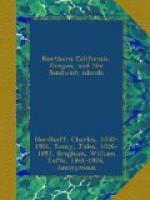(7.) A tradition exists, mentioned by Jarves, that Paao landed at Kohoukapu before the reign of Umi. According to the same author, Paao was not a Kanaka, but a man of the Caucasian race. However this may be, every one agrees that Paao was a foreigner, and a naauao (scholar; literally, a man with enlightened entrails, the Hawaiians placing the mind and affections in the bowels).
(8.) Hina, according to tradition, brought into the world several sons, who dug the palis of Hulaana. It may be asked whether Hina, which means a fall, does not indicate a deluge (Kaiakahinalii of the Hawaiians), or some sort of cataclysm, and whether the islanders have not personified events.
(9.) It is, however, improbable that there were ever genuine sorcerers among the Hawaiians, in the sense that word has among Christians. It may have happened, and indeed it happens every day, that people die after the machinations of the kahuna-anaana; but it is more reasonable to refer these tragical deaths to the use of poison, than to attribute them to the incantations of the sorcerers. It is moreover known that there are on the group many poisons furnished by trees, by shrubs and sea-weeds; and the kahuna-anaana understood perfectly these vegetable poisons. The many known examples of their criminal use inclines us to believe that these kahuna were rather poisoners than magicians. [Kalaipahoa, the poison-god, was believed to have been carved out of a very poisonous wood, a few chips of which would cause death when mixed with the food.]
(10.) During the summer of the year 1852, while I was exploring the island of Kauai, I was near being the victim, under remarkable circumstances, of an old kahuna named Lilihae. I was then residing under the humble roof of the Mission at Moloaa. Lilihae had been baptized, and professed Christianity, although it was well known that he clung to the worship of his gods. He was introduced to me by the missionaries as a man who, by his memory and profession, could add to my historical notes. I indeed obtained from him most precious material, and in a moment of good nature the old man even confided to me the secret of certain prayers that the priests alone should know. I wrote down several formulae at his dictation, only promising to divulge nothing before his death. The old man evidently considered himself perjured, for after his revelations he came no more to see me.
Some days had passed after our last interview, and I thought no more of him. All at once I lost my appetite and fell sick. I could eat nothing without experiencing a nausea, followed immediately by continual vomiting. Two missionaries and my French servant, who partook of my food, exhibited almost the same symptoms. Not suspecting the true cause of these ailments, I attributed them to climate and the locality, and especially to the pestilent winds which had brought an epidemic ophthalmia among the natives. Things remained in this condition




